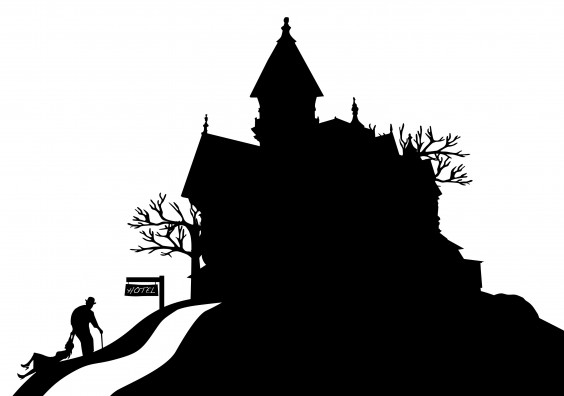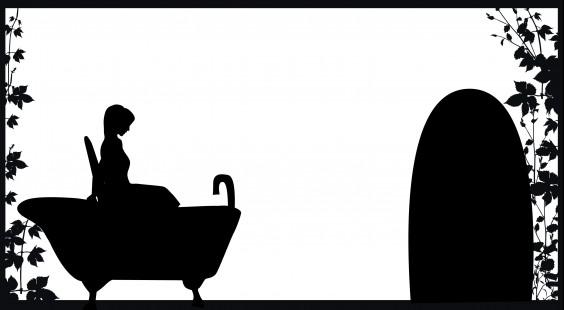

At the top of a dark and heavily weeded hill there is a house that looks,
no matter the weather or tilt of the sun, more like the shadow of a
house than one made of planks and trim. It is covered like aging skin
with crows feet, and frown lines connect creaking shutters, to leaking
downspouts, to cracked and crumbling chimney pots. All around it, from
its cellar doors to its silhouetted gables, have grown up creeping charlie
and chickweed. Herbs and ivy eclipse the light of less enterprising buds
and stifle the planned Victorian greenery of long ago.
At the very top of the house, there is one light lit, and in that light
sits a man, a hairy stub of man, reading and sipping intermittently
from a chipped porcelain teacup. He has welcomed the weeds in
through the window, twirls them between his fingers to release
their pungent fumes, and is careful not to crush their tender stems
when he closes the sash. Their tendrilous shoots find their way along
the inner walls, past the chipped molding of the dumbwaiter and
into the musty shaft. There, they explore the dank innards of the
house in search of the small elevator that transports the man’s cups
and saucers from floor to dusty floor. He gives the them free rein
after witnessing a spot of birdweed overtake his mother’s roses one
summer; he admires them as aggressive expatriates, villainized only
by virtue of their displacement.
The man has read stories about every possible thing; he has scoured
the withered pages of books on shelves flocking fireplaces and landings
in his yellowed library, and has settled upon a tattered boxed collection
of Hawthorne, which he reads and rereads over and over again. He
leaves the house only for groceries, which he buys at a convenience
store at the end of the dirt road that leads from the house to the town
at the bottom of the hill. He has no idea that there is an excellent
produce stand just a mile further up, and as a result he suffers from
scurvy and a steady diet of white bread and beef jerky. His vocabulary
is magnificent. His habits are mundane. He has buried both of his
parents in the back under the raised mounds of clover and henbit, and
he is the only one that knows anymore how they died.
Every night, the man climbs down splintered flights from the
turret and emerges onto the garden side balcony. And there, no
matter the weather or phase of the moon, he opens up his tiny sliver
of a mouth and screams, and he thinks to himself how much he loves
to sing this beautiful song that he learned from his mother when he
was only a child.
At the bottom of the hill there is a girl. He sees her driving a
turquoise convertible past the gas station and flitting in and out of
the crowded aisles of the convenience store buying candy and bits
of brightly colored girl things. He sees her over the seasons bundled
in coats and scarves and wearing tank tops and shorts, and once in
only a bathing suit and flip-flops. One day he overhears her telling the
clerk that she is contemplating a vacation, that she loves sleeping in
caravansary beds, that she has the inclinations and the meandering
disposition of a wayfaring sojourner.
That night, he returns home and thinks about the girl’s lovely
vocabulary. He makes a sign out of a scrap of tin and several pieces
of cloth tape. He hangs it from the rusted iron signpost in front of the
house. His sign says HOTEL .
From this point on, he is certain the girl will find her way up the
dirt road of the hill, past the unmade beds of weeds and nettles, see
the sign hanging on the post, and ask him if he would describe the
beds inside as “caravansary,” if he wouldn’t mind helping her wearied
meandering soul up the front porch stairs with her “valise.”
“Your locution is lovely,” he tells her in this dream. She laughs and
brushes her hair back off her shoulders.
“If you aren’t careful,” she tells him, “I just might stay here forever!”
He laughs too, though it isn’t quite as charming.
The girl will probably spend the first evening exploring the nooks
and crannies of the house he has grown old in. She will probably be
charmed by the foggy layer of dust on all of the cabinets, the thick
film of age on every bookcase and tabletop. She will probably lift one
of the furniture sheets off of the settee in the parlor and try to peek
underneath it. And if she does, he will try to startle her and hope this
makes her laugh again. He has never seen anything better than the
girl laughing and brushing her hair back off her shoulders. She will
act mad at first, but then she will forgive him, whip the sheet off, and
throw herself down on the cushions and say, “Read me a story, won’t
you? I am so in the mood for a story.”

Illustration by Susie Kirkwood
He imagines that she will become bored with his reading. She will
set down her teacup on its saucer and make a big show of yawning.
She will ask which of the tubs upstairs she should use for a bath. He
will show her to the cast-iron soaker on the top floor in the annex. He
will beat the dust out of a bath towel when she isn’t looking, and then
he will go out onto the balcony, to give her privacy, to sing his mother’s
song while she bathes.
When she is clean and dry, he will dress her in the prettiest thing
he can find in the abandoned wardrobes and chifforobes on the upper
floors. He will brush her hair and tie it in a red ribbon. He will refill
her teacup and hold her pale white hand. One day she will ask about
his parents, and he will take her out back to meet them, under the
mounds of clover and henbit, and there he will tell her how they died
and about the beautiful song they left him with.
When she is ready, he will bring her up to the very top of the house,
and he will marry her there in the transparent light of the moon. She
will be beautiful and quiet. She will not laugh. He will hold her tightly,
so that she will stand very still. And she will not say “I do,” but she will
let her head fall and this will make a nod, a single nod, and this is how
she will tell him that she will be his, forever.
The weeds continue to creep in through the windows and it is no
less dusty or dark. She is a good wife. She wants to be with him all of
the time. How silly it is that she wants to sit in the dumbwaiter so that
no matter what floor of the house he finds himself on, he can open up
a small wooden door and find her there. She never tires of saying “Oh
there you are!” laughing and brushing her hair back off her shoulders.
He gently pushes her long legs back underneath her when he closes
the door, and she waits for him there, always on the other side.
Susie Kirkwood & Jill Summers are sisters. Susie is a freelance graphic designer with a tiny jam-making company called Pear Tree Preserves. Jill Summers writes short stories, puppet shows, and once, a play. The two have collaborated with other artists and writers on many shows and projects around Chicago, including a book trailer for the novel Ghosts by Cesar Aira, a shadow show for Jesse Ball’s novel The Curfew, and an installation for House Dreaming, curated by Audrey Niffenegger at Ragdale. (www.susiekirkwood.com | www.dottysummers.com)















click to see who
MAKE Magazine Publisher MAKE Literary Productions Managing Editor Chamandeep Bains Assistant Managing Editor and Web Editor Kenneth Guay Fiction Editor Kamilah Foreman Nonfiction Editor Jessica Anne Poetry Editor Joel Craig Intercambio Poetry Editor Daniel Borzutzky Intercambio Prose Editor Brenda Lozano Latin American Art Portfolio Editor Alejandro Almanza Pereda Reviews Editor Mark Molloy Portfolio Art Editor Sarah Kramer Creative Director Joshua Hauth, Hauthwares Webmaster Johnathan Crawford Proofreader/Copy Editor Sarah Kramer Associate Fiction Editors LC Fiore, Jim Kourlas, Kerstin Schaars Contributing Editors Kyle Beachy, Steffi Drewes, Katie Geha, Kathleen Rooney Social Media Coordinator Jennifer De Poorter
MAKE Literary Productions, NFP Co-directors, Sarah Dodson and Joel Craig